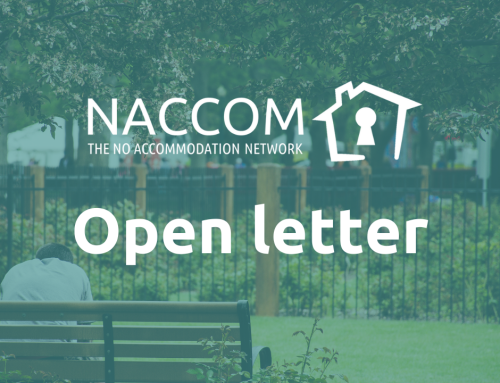Abigail Housing is a West Yorkshire based charitable company supporting and housing destitute people who are seeking, or have recently been granted, asylum. The charity houses newly recognised refugees in Leeds and houses people who have been refused asylum in Bradford. We caught up with their retiring Chair of Trustees, Will Sutcliffe (for details of the recruitment for this role, see here) to hear more about how their work has developed over the last eighteen months and the difference greater sustainability has made.
‘After attending NACCOM’s ‘Funding Your Project’ conference in April 2017, we had an away day for Abigail staff and trustees in July 2017. Fundraising was a key focus, as we knew we needed to become more sustainable.’
Supported housing
Since then, lots of changes have taken place, including securing an ongoing and increased commitment from the council for its ‘exempt accommodation rates’ (a higher rate of housing benefit provided in exchange for intensive management of tenancies and support for newly recognised refugees moving on from asylum support).
This additional funding, Will explains, has helped Abigail to ‘increase the quality of the support and accommodation we can offer, as well as expand staffing hours’. The project now not only has a larger proportion of properties funded directly through exempt rates, but has also been able to expand the overall number of bed spaces available. This is vital in a city like Leeds which receives such a large number of refugees from across the region.
Such a change is especially significant against a backdrop of uncertainty within the supported housing sector which lasted for over two years, until the government announced a u-turn on their proposed policy changes in August 2018. Before then, there was a very real prospect that providers of ‘exempt accommodation’ would find themselves in competition for ringfenced resources locally, which could – at their worst- have put projects like Abigail out of business.
NACCOM made calls for change on this issue along with many others in the sector and beyond, and the team at Abigail engaged with local MPs to advocate on their behalf (one of whom was the keynote speaker at their 2017 AGM).
Community engagement and recruitment of volunteers
Meanwhile over in Bradford, changes have included recruiting a volunteer fundraiser, who focuses on trust applications. This has freed up other staff and volunteer time to raise the project’s profile and increase local support.
On this, Will says; ‘It sounds obvious but it is so important. We know other NACCOM members do this really well and it’s something we wanted to develop. We are getting out there doing talks, stalls, visiting churches, and we’ve got a regular newsletter now. Through these changes and more, we are seeing a significant increase in support as a result in terms of donations (financial, food and other essential items) and volunteering.’
Will shared a story to illustrate the depth of commitment and investment that they’ve seen from the local community in recent months; ‘Two people recently offered to donate houses to Abigail’s destitution project but as they weren’t suitable to be used directly, they are now renting them out and donating the rent to the project instead!’
Such changes have enabled the project to start this year on a strong financial footing, although Will is keen to stress that they still have a lot of work to do to secure long term funding for ongoing costs.
Media coverage
The charity has also benefited from exposure in the 2017-18 Guardian appeal (see here and here), which Will says ‘helped to build our credibility and our reputation’.
Investment in the Board of Directors
Meanwhile the Board of Directors has spent a lot of time and effort recruiting new people with different expertise, including business experience. This is essential for the long term strategy and development of the projects, Will explains, because ‘if you haven’t got the people to manage what you’re doing, then it isn’t sustainable’.
Want to explore funding ideas and routes to sustainability with others in the sector and beyond? We’d encourage you to book now to attend our 2019 Funding Your Project conferences, taking place on the 29th April (Leeds) and 14th May (London). Tickets and full programme information can be found here.




